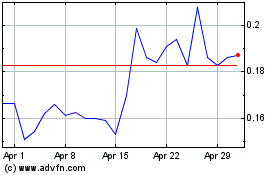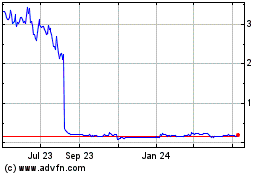Galera Therapeutics Announces ASTRO Late-Breaker Presentation of Topline Safety and Efficacy Data from its Double-Blind, Plac...
September 08 2020 - 8:00AM

Galera Therapeutics, Inc. (Nasdaq: GRTX), is a clinical-stage
biopharmaceutical company focused on developing and commercializing
a pipeline of novel, proprietary therapeutics that have the
potential to transform radiotherapy in cancer. Today, Galera
announced that data from its double-blind, placebo-controlled pilot
Phase 1b/2a clinical trial of avasopasem manganese (GC4419) in
combination with stereotactic body radiation therapy (SBRT) for
locally advanced pancreatic cancer has been selected for
presentation during the Late-breaking Special Session at the 2020
ASTRO Annual Meeting, which is taking place virtually October
25-28, 2020. GC4419 is an investigational, highly selective small
molecule superoxide dismutase mimetic designed to rapidly and
selectively convert superoxide to hydrogen peroxide and oxygen.
Details of the presentation are as follows:
Abstract Title: “Randomized, Double-Blinded,
Placebo-controlled Multicenter Adaptive Phase 1-2 Trial of GC4419,
a Dismutase Mimetic, in Combination with High Dose Stereotactic
Body Radiation Therapy (SBRT) in Locally Advanced Pancreatic Cancer
(PC)”Session Title: SS 19 – Late-breaking Special
SessionSession Date: Tuesday, October 27,
2020Session Time: 3-4:15 p.m. EDT
Presenter: Cullen Taniguchi, MD, MD Anderson
Cancer Center
For more information about the 2020 ASTRO Annual Meeting, please
visit
https://www.astro.org/Meetings-and-Education/Micro-Sites/2020/Annual-Meeting.
About GC4419 (Avasopasem Manganese) Galera’s
lead product candidate, avasopasem manganese, is an
investigational, highly selective small molecule superoxide
dismutase (SOD) mimetic that is initially being developed for the
reduction of radiation-induced severe oral mucositis (SOM), which
is not yet approved. Avasopasem is designed to rapidly and
selectively convert superoxide to hydrogen peroxide and oxygen,
protecting normal tissue from damage associated with radiation
therapy. Left untreated, elevated superoxide can damage
noncancerous tissues and lead to debilitating side effects,
including oral mucositis (OM), which can limit the anti-tumor
efficacy of radiation therapy.
Avasopasem is currently being studied in the ROMAN trial, a
randomized, double blind, placebo-controlled Phase 3 trial of
approximately 450 patients (NCT03689712, available
at clinicaltrials.gov) to investigate the effects of
avasopasem on radiation-induced OM in patients with locally
advanced head and neck cancer. In Galera’s 223-patient,
double-blind, randomized, placebo-controlled Phase 2b trial in
patients with locally advanced head and neck cancer receiving
concurrent radiation therapy, avasopasem produced a statistically
significant reduction in duration of severe oral mucositis (SOM)
from 19 days to 1.5 days (92 percent) in the 90 mg treatment arm.
Avasopasem also demonstrated clinically meaningful reductions in
SOM incidence through completion of radiation by 34 percent and in
the severity of OM (incidence of Grade 4 OM) by 47 percent in the
90 mg treatment arm. The overall adverse event profile of
avasopasem in the Phase 2b trial was similar to that of placebo and
consistent with the known adverse effects of chemoradiation, with
reductions of blood cell counts, particularly low lymphocyte
counts, the most prominent adverse effects. Adverse events
considered attributable to avasopasem were limited to mild,
transient postural light-headedness or decreased blood pressure.
Patients were followed for two years after enrollment and showed no
difference in tumor outcomes between active and control, consistent
with expectations for combinations with intensity-modulated
radiation therapy (IMRT)/cisplatin, suggesting that the efficacy of
the chemoradiation therapy was not compromised.
Avasopasem is also currently being studied in a Phase 2a trial
for its potential to reduce the incidence of radiation-induced
esophagitis in patients with lung cancer (NCT04225026, available
at clinicaltrials.gov); and completed enrollment in a pilot
Phase 1/2 trial (NCT03340974, available at clinicaltrials.gov)
in combination with stereotactic body radiation therapy (SBRT) in
patients with locally advanced pancreatic cancer.
The U.S. Food and Drug Administration granted Fast
Track and Breakthrough Therapy designations to avasopasem for the
reduction of SOM induced by radiotherapy.
About Galera Therapeutics
Galera Therapeutics, Inc. is a clinical-stage biopharmaceutical
company focused on developing and commercializing a pipeline of
novel, proprietary therapeutics that have the potential to
transform radiotherapy in cancer. Galera’s lead product candidate
is avasopasem manganese (GC4419), a highly selective small molecule
superoxide dismutase (SOD) mimetic initially being developed for
the reduction of radiation-induced severe oral mucositis (SOM).
Avasopasem is being studied in the Phase 3 ROMAN trial for its
ability to reduce the incidence and severity of SOM induced by
radiotherapy in patients with locally advanced head and neck cancer
(HNC), its lead indication. It is also being studied in a Phase 2a
multi-center trial in Europe assessing the safety of avasopasem in
patients with HNC undergoing standard-of-care radiotherapy, a Phase
2a trial for its ability to reduce the incidence of esophagitis
induced by radiotherapy in patients with lung cancer and completed
enrollment in a pilot Phase 1/2 trial in combination with
stereotactic body radiation therapy (SBRT) in patients with locally
advanced pancreatic cancer. The FDA granted Fast Track and
Breakthrough Therapy designations to avasopasem for the reduction
of SOM induced by radiotherapy. Galera is headquartered in Malvern,
PA. For more information, please visit www.galeratx.com.
Forward-Looking Statements
This press release contains forward-looking statements within
the meaning of the Private Securities Litigation Reform Act of
1995. All statements contained in this press release that do not
relate to matters of historical fact should be considered
forward-looking statements, including without limitation statements
regarding the plans and timing for the release and presentation of
data from clinical trials; and upcoming events and presentations.
These forward-looking statements are based on management’s current
expectations. These statements are neither promises nor guarantees,
but involve known and unknown risks, uncertainties and other
important factors that may cause Galera’s actual results,
performance or achievements to be materially different from any
future results, performance or achievements expressed or implied by
the forward-looking statements, including, but not limited to, the
following: Galera’s limited operating history; anticipating
continued losses for the foreseeable future; needing substantial
funding and the ability to raise capital; Galera’s dependence on
avasopasem manganese (GC4419); uncertainties inherent in the
conduct of clinical trials; difficulties or delays enrolling
patients in clinical trials; the FDA’s acceptance of data from
clinical trials outside the United States; undesirable side effects
from Galera’s product candidates; risks relating to the regulatory
approval process; failure to capitalize on more profitable product
candidates or indications; ability to receive Breakthrough Therapy
Designation or Fast Track Designation for product candidates;
failure to obtain regulatory approval of product candidates in the
United States or other jurisdictions; ongoing regulatory
obligations and continued regulatory review; risks related to
commercialization; risks related to competition; ability to retain
key employees and manage growth; risks related to intellectual
property; inability to maintain collaborations or the failure of
these collaborations; Galera’s reliance on third parties; the
possibility of system failures or security breaches; liability
related to the privacy of health information obtained from clinical
trials and product liability lawsuits; unfavorable pricing
regulations, third-party reimbursement practices or healthcare
reform initiatives; environmental, health and safety laws and
regulations; the impact of the COVID-19 pandemic on Galera’s
business and operations, including preclinical studies and clinical
trials, and general economic conditions; risks related to ownership
of Galera’s common stock; and significant costs as a result of
operating as a public company. These and other important factors
discussed under the caption “Risk Factors” in Galera’s Quarterly
Report on Form 10-Q for the quarterly period ended June 30, 2020
filed with the U.S. Securities and Exchange Commission (SEC),
Annual Report on Form 10-K for the year ended December 31, 2019 and
Galera’s other filings with the SEC could cause actual results to
differ materially from those indicated by the forward-looking
statements made in this press release. Any forward-looking
statements speak only as of the date of this press release and are
based on information available to Galera as of the date of this
release, and Galera assumes no obligation to, and does not intend
to, update any forward-looking statements, whether as a result of
new information, future events or otherwise.
Investor Contacts:Christopher DegnanGalera
Therapeutics, Inc.610-725-1500cdegnan@galeratx.com
Jennifer PorcelliSolebury
Trout646-378-2962jporcelli@soleburytrout.com
Media Contact:Gina Cestari6
Degrees917-797-7904gcestari@6degreespr.com
Galera Therapeutics (NASDAQ:GRTX)
Historical Stock Chart
From Mar 2024 to Apr 2024

Galera Therapeutics (NASDAQ:GRTX)
Historical Stock Chart
From Apr 2023 to Apr 2024
